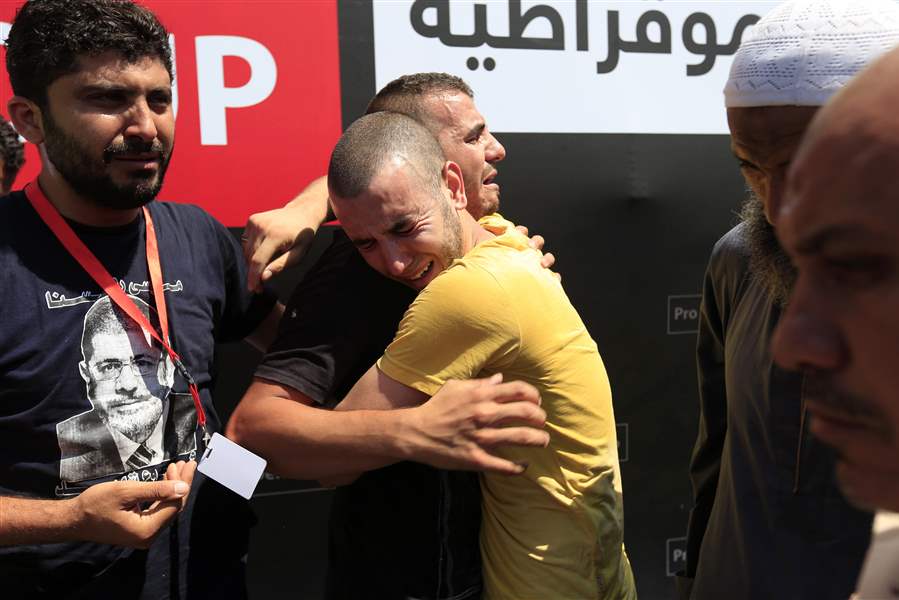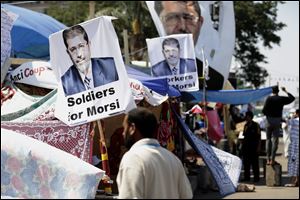
Tensions high over planned Friday rallies amid questions over Egypt army chief's intentions
7/25/2013
Egyptians mourn for Omar Mohammad al-Sayyid, 19, during his funeral today where supporters of ousted President Mohammed Morsi have installed their camp and hold their daily rally, at Nasr City, in Cairo.
ASSOCIATED PRESS

Egyptians mourn for Omar Mohammad al-Sayyid, 19, during his funeral today where supporters of ousted President Mohammed Morsi have installed their camp and hold their daily rally, at Nasr City, in Cairo.
CAIRO — Political allies of Egypt’s military lined up behind its call for huge rallies Friday to show support for the country’s top general, pushing toward a collision with Islamist opponents demanding the return of the nation’s ousted president.
But there was widespread uncertainty over the army’s intentions — and worry that the military is whipping up a dangerous populist fervor.
Gen. Abdel-Fattah el-Sissi, who ousted Egypt’s elected president on July 3, took many by surprise when he announced this week that he wanted people to take to the streets in large numbers on Friday to give him a popular mandate to take the necessary measures against “violence and terrorism.”
El-Sissi’s call was widely interpreted as a prelude to a crackdown on the Muslim Brotherhood, the Islamist group from which the ousted Mohammed Morsi hails, and other Islamists who have been camped out for about a month at sit-ins in Cairo and elsewhere calling for Morsi’s reinstatement.
That has hiked fears of a violent confrontation. Islamists also plan pro-Morsi rallies on Friday, raising the possibility of street clashes, as has happened repeatedly in recent weeks.
Islamists today lashed out at the military, saying el-Sissi’s call signals a plan to crush what they insist are their peaceful protests. The spiritual leader of the Brotherhood, Mohammed Badie, hiked up his rhetoric against el-Sissi, saying ousting Morsi was a worse crime than if the general had destroyed the Kaaba, Islam’s holiest site — an attempt to fire up the religious fervor in the pro-Morsi camp ahead of Friday’s rallies.
On the other side, state TV and pro-military private networks were doing their part to back el-Sissi: They announced that the wildly popular mini-series shown during the current holy month of Ramadan will not be aired Friday to ensure that large numbers go out onto the streets. Some of them were airing patriotic songs.
Still unclear is what exactly el-Sissi meant by seeking a mandate against violence — and how far the military would go. The most explosive move would be if troops were to eventually try to clear major Islamist sit-ins. The largest has been outside Cairo’s Rabaa al-Adawiya mosque, where crowds some nights have grown to tens of thousands.
A more limited move would be for troops to take tougher action against any sign of Morsi supporters engaged in violence. Some Islamist protesters have been seen with weapons — though their opponents have been as well, and each accuses the other of sparking clashes. Another possibility is that the military would detain Brotherhood and other Islamist leaders who already face arrest warrants.
Today military spokesman Col. Ahmed Mohammed Ali said el-Sissi’s call was “not a threat to any specific political group.” He said the military respects peaceful protests.
But he said any violence or terrorism will be “dealt with decisively and with force” — signaling a likely tough approach on any sign of violence, which Islamists’ opponents have largely blamed on the pro-Morsi camp.

A supporter of Egypt's Islamist President Mohammed Morsi in front pictures of the ousted president.
He said a national reconciliation conference and a system of transitional justice, called for by interim military-backed President Adly Mansour, are the only way out of Egypt’s current standoff.
The military dropped leaflets on Morsi supporters outside the Rabaah al-Adawiya Mosque, trying to reassure them about their safety.
“We are not against you so don’t be against us. Don’t raise your weapons in the face of your brothers, don’t destroy, don’t burn, and let us all be together against killing, violence and terrorism,” the leaflets said.
What confounded many, however, is why el-Sissi felt he needed a popular cover if he only intends to stop violence. As the military’s chief and defense minister, el-Sissi would have been within his rights to preserve security.
For some, even in the anti-Morsi camp, his call raised suspicion that the military will take extra-ordinary measures in a crackdown, highlighting worries over past abuses by troops. Some saw it as a sign el-Sissi was trying to gauge his appeal for a possible presidential run.
Mustafa Shawky, a leftist activist who was among the early voices that articulated the demands of the 2011 uprising that ousted autocrat Hosni Mubarak, spoke of being caught between worries about “military fascism” and “religious fascism” — referring to Islamist rule under Morsi.
While the military was needed to remove Morsi, he said, el-Sissi’s call for the rallies undermines the army’s stance that the ouster was not a coup.
“It is a mistake not to see the mandate he sought as one to kill,” Shawky told The Associated Press. The atmosphere of rallying behind the military against the Islamist could become “a cover for serious violations,” he warned.
April 6, an influential youth group that played a key role in the anti-Mubarak uprising, also expressed its surprise at el-Sissi’s call, saying the army doesn’t need a popular mandate to act against security threats. But it said the army should “eradicate all signs of arming and violence in a way governed by the law and without exceptional measures.”
Suspicion of the military’s intentions is rooted in the nearly 17 months during which it directly ruled the country after Mubarak’s ouster. Activists blame it for human rights violations, including the torture of detainees and trying civilians before military tribunals. A repeat of that, even on a small scale, is likely to inject tension into or unravel the uneasy alliance between liberal groups and the military.
The military has been the dominant force in Egypt’s politics since the 1952 coup that toppled the monarchy. It has since given Egypt all of its presidents except Morsi, the nation’s first freely elected leader, and wielded vast influence from behind the scenes.
Made up heavily of conscripts and with a history of four wars against Israel, the army also holds a strong base of support among Egyptians, many of whom see it as a pillar of the country’s identity.
El-Sissi has tapped into the strong pro-military sentiments and the deep frustration with Morsi’s one-year rule. The state media, always quick to revere the strongman of the day, has framed his call for rallies in glorious terms and raised its already high anti-Brotherhood rhetoric.
Today, Tamarod — the youth group behind the wave of protests that led to the military coup against Morsi — urged Egyptians to participate in Friday’s demonstrations, as did the main anti-Morsi opposition grouping, the liberal National Salvation Front.
“Whoever wants to genuinely complete the revolution must be out in the squares and in all the provinces,” said Mahmoud Badr, spokesman for Tamarod.
Clashes have frequently erupted between pro-Morsi protesters and authorities or Morsi opponents. At the same time, attacks by Islamic militants in the Sinai Peninsula have surged. More than 180 people have been killed since Morsi’s fall.
Today, two border guards — an officer and a soldier — were killed and three others wounded when suspected militants fired rockets at their checkpoint in the Sinai town of Sheikh Zuweyid town, a stronghold of radicals.
The Obama administration gave el-Sissi a major boost on the eve of the rallies.
It is planning to tell lawmakers Thursday that it won’t declare Morsi’s overthrow a coup, according to U.S. officials, who spoke on condition of anonymity because they were not authorized to discuss the plans with the press. That determination allows the United States to continue providing $1.5 billion in annual military and economic aid.
Still, ahead of Friday’s rallies, the White House said it was “concerned by any rhetoric that inflames tensions and could possible lead to violence” and urged Egyptian security forces to exercise “maximum restraint.”
Islamists, meanwhile, lashed out at the military as they geared up for their own rallies Friday.
A prominent pro-Brotherhood cleric, the Qatar-based Sheik Youssef el-Qaradawi, called on soldiers and officers in the military “not to listen to el-Sissi’s commands ... Don’t kill your brother.”
In a speech aired on Al-Jazeera’s Egypt affiliate, he called el-Sissi’ message “an incitement to divide the Egyptian people” by labeling some as “terrorists.”
Badie, the spiritual leader of the Brotherhood, denounced el-Sissi as a “traitor” and urged him to repent.
“I swear by God that what el-Sissi did in Egypt is more criminal than if he had carried an axe and demolished the holy Kaaba stone by stone,” Badie said in a weekly speech. The Kaaba is the cube-shaped shrine in the Saudi city of Mecca that Muslims worldwide face in their daily prayers.